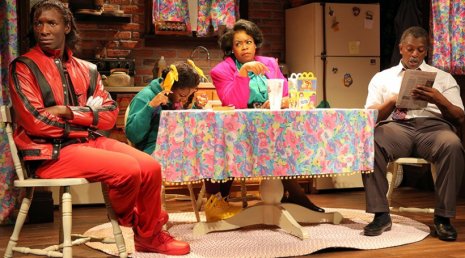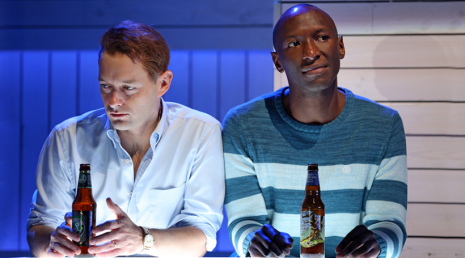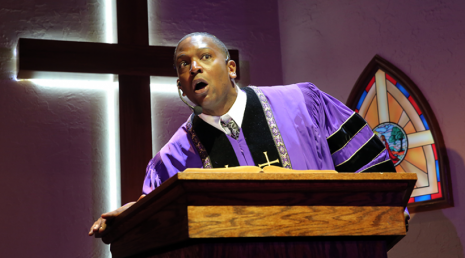Chapter Two
I’ll start with Mankind because it's the most recent. I don’t think of it as a Feminist play, because it has no women in it. A man wrote it, and the only female character dies halfway into the story. My intention in writing the play was to satirize Patriarchy. Feminism crept in unexpectedly--a character walked into the play and asked another character, “Have you ever heard of the word ‘feminism?’” The other character said “No.” I was like, “Wow.” So I found the form as I was writing it. I had written a 10-minute play about something men never have to negotiate, that is telling someone that you’re pregnant and hearing that person say all the wrong things.
I like imagining the unimaginable, opening up a rabbit hole in the ground and just following it down into the darkness. Another motto I keep in mind is “Find Beauty in the Horror.” I try to make difficult and challenging topics or ideas beautiful, even in their horror. In some strange way we humans are compelled to watch horrific moments in every day life--a man jumping off a building, a car blowing through a crowd, a train crash, a street brawl, a domestic dispute in public, a riot, a destructive storm. If you can present something difficult with wrapping paper and a bow, your audience will go further along the journey with you. I try to make people laugh and then choke them.
This leads me to Bootycandy and Barbecue, both satires as well. Bootycandy was never meant to be a full-length play. I had written a series of semi-autobiographical short plays over a decade with no connection other than that I’d written them. Some were commissions, some just musings. After an evening of my shorts, called Bootycandy, Woolly Mammoth's Howard Shalwitz called me with Miriam Weisfeld, Woolly's head of play development at the time. They said something like, "We think some of the characters deserve further examination and could be brought into a larger narrative.” I responded, "You’re both crazy. Those plays have nothing to do with each other. They’re random." Some literally had no character names other than Man and Woman or One and Two. A few days later I looked at them again and thought, there might be something there.
I threw out half of the plays and decided to treat the remaining plays as if each had been written by a different Black playwright. I would bring all those playwrights on the stage for a conference. Instantly I knew I had something. Each of the plays live in a different decade, because each is a reflection of a different part of my creativity. Bootycandy is a play that refuses to be a play, and yet it ends up being one.
Barbecue came about when my friend and dramaturg Rebecca Rugg asked me, “What are black folks thinking about these days?” I said something like, “Don’t know. Why don’t you ask them?” And we both laughed. Her boss at the time, the legendary Martha Lavey asked me to write something for Steppenwolf, a theater famous for family dramas--WHITE family dramas. I’d always wanted to see if you could tell the same story with two different groups of people. My last name is O'Hara, and no one in their right mind expects a Black person to walk into a room after hearing that O'Hara is coming. I thought there must be a parallel group of white folks named O'Hara, just as crazy as my family. Every character in Barbecue is named after my mother, Aunts or Uncles of mine, even the ones spoken about and not seen. (My Grandparents had twelve kids, so I have a lot of Aunts and Uncles, all--to a person--Nutz!) They are why I am who I am.
My family picnics featured a bunch of black folks dancing and singing and laughing and cuttin' up, everyone wearing white t-shirts with the name O'HARA in big letters. We must have looked like complete fools running around the park-- LOUD as we wanna be, like we owned it. Every family has their own tomfoolery, but America likes to divide us, despite talk about coming together. In our prejudices and racism we accept certain behavior from one race and not the other.
I was also led to write Barbecue by the phenomenon of “Watching White Folks Do Shit," by the plethora of programs where we Watch White Folks Do Shit. Watch the white man go around the world to "exotic" places and EAT. That's the entirety of the show! Or watch the white man fix a car, watch the white man build a house, sell a house, find a wife, get an Intervention, go to rehab, etc. etc. I kept saying to myself, "Black folks EAT! We fix cars and build houses; we do drugs. I have several relatives who are addicted to something. Why ain’t we getting a damn Intervention on TV or being given a free fucking trip to rehab?"
There was even a show called Sixteen and Pregnant, and I’m like, "WHAT?!?" There are plenty of Black folks that are sixteen and pregnant. Do you think they got their own damn TV show? No. It's like America thinks that only White folks live lives. Black folks are just acting Black. We ain’t actually LIVING. We just being Black. Which is a bunch of bullshit but also hilarious when you think about it. Barbecue talks about race without actually talking about race.
My name reminds me of prejudice and the dark history of slavery. At the same time it reminds me of picnics with my amazing ancestors in t-shirts with a White Irish Slave Master’s name plastered on them. That is indeed the "Beauty in the Horror."
I believe in creating a THEATER OF CHOKE, where the work isn’t easily digestible, where the work is work. Choking reminds you that you are living, that you are breathing, that you are HERE, taking up SPACE. You should be able to feel the consequences of a play. There used to be a time when you had to actually go to a Porn Store to get your porn. You had to get up off your couch and go downtown into a porn store. I remember getting porn and being struck by people pretending they were not in a porn store, acting like they were in some high-end library or something. I’m like, "Why are we all pretending? We’re in a fucking Porn store! Lift your head up and act Proud be in a Porn Store!” I try to structure my plays so that within fifteen or twenty minutes you KNOW what store you’re in. And if your discomfort hasn’t made you leave the theater already, then you deserve what you get. I want everyone in the theater to WANT to be there. That’s thrilling. When everyone is holding their own little brown bags. And acknowledging we all WANT to be right where we are and intend to stay here for as long as the ride lasts.
Bootycandy announces in the first scene that "Bootycandy" means dick. If you are not comfortable hearing--and eventually seeing--dick, you need to GET OUT now, cuz it will only get worse. Barbecue announces early that we are going to skip back and forth from a black family to a white one, all cussing and acting the fool. If you don’t want that experience, you should GET OUT now. It will only get worse. In the first scene of Mankind we learn that Men can have babies and abortion has become illegal. If you are not down with that discussion, GET OUT now.
I have another motto: "GET ON THE BUS OR GET OFF THE BUS." As a director or writer I create an event or a machine--a bus. When you come to see my work you are welcomed to GET ON THE BUS. But you cannot tell me to slow down or take you to your doorstep or stop being so loud or running red lights or taking so many curves. You either GET ON THE BUS or YOU GET OFF THE BUS. You are on MY BUS. Welcome. It will not be safe. It will be uncomfortable and dangerous, but, if you stay, you will survive to tell about it.
How did these mottos start? I think because I was always called Risky or Provocative or Emerging or whatever silly name folks give to work they want to marginalize. Even if they are embracing the work, they are still making me into a novelty act, a monkey on the corner, spinning a knob on a magic box. So I determined to name my own truths. I’m not Risky. I’m just not trying to make you safe or comfortable, because frankly ain’t nobody in this damn country trying to make ME safe or comfortable. I wake up everyday, and I am uncomfortable with what is happening around me. Ain’t nobody there to make it comfortable for my black gay body, so why should I invest in making others comfortable? My creativity is an expression of who I am and of the world I live in. America and I have an uncomfortable relationship. That is my own Beauty in the Horror.
*********
Todd London is executive director of the University of Washington's School of Drama. He spent 18 seasons as artistic director of New York's New Dramatists, the nation's oldest laboratory theatre for playwrights. Books include, An Ideal Theater; Outrageous Fortune: The Life & Times of the New American Play; and The World's Room, a novel. He was the first recipient of Theatre Communications Group’s Visionary Leadership Award and is the founder of The Third Bohemia, a series of national artistic retreats.




